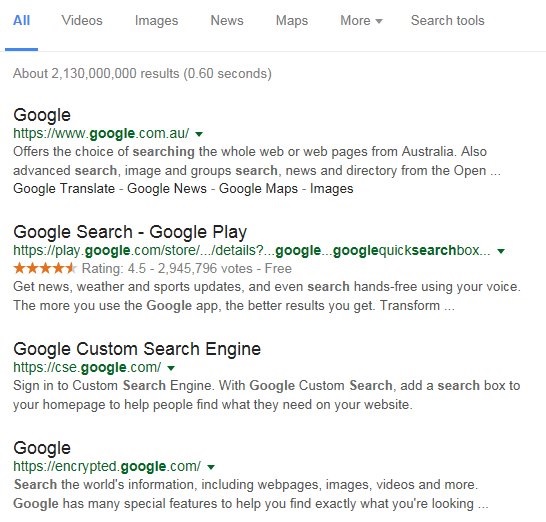Google is currently testing a colour change for its search results, moving from the iconic blue links to a more monochrome black… and some users aren’t happy.
Under a new test, Google has replaced traditionally blue link titles with black ones. The body text and link addresses remain unchanged, being black and green respectively.
Users began reporting the visual change on Sunday, suggesting that Google is embarking on one of its famous “A/B tests”.
The company regularly makes a small change for a subset of users, examining how they respond before deciding whether or not to roll it out to the wider user base.
If the comments from users on Twitter, Reddit and Google’s forums are any indication, it is not likely that the changes will be rolled out across the board any time soon.
@google Google! The black unclicked links look terrible and are not very functional! #BringBackTheBlue pic.twitter.com/mkKsrar3B3
— Joseph Madden (@Hyper200) May 9, 2016
Paying attention to the little things has paid off for Google in the past. Famously, when it decided to introduce adverts on Gmail, it ran a test to pick between 40 different shades of blue.
In 2014, Google UK’s managing director, Dan Cobley, said what happened next: “We saw which shades of blue people liked the most, demonstrated by how much they clicked on them. As a result we learned that a slightly purpler shade of blue was more conducive to clicking than a slightly greener shade of blue, and gee whizz, we made a decision.
“But the implications of that for us, given the scale of our business, was that we made an extra $200m a year in ad revenue.”
Other than the red links it uses in China, and different shades of its blue Google has not used other colours for its search results before.
Google is not the only major technology company to carry out A/B tests on its users. Netflix recently admitted that it tests six different images for many TV and movie titles, and rolls out the one that most viewers click on.
Facebook has also conducted tests designed to emotionally manipulate users by highlighting positive and negative emotions, while OK Cupid has deliberately matched incompatible people to see the outcomes.
In an update, Google sent a statement on the change: “We’re always running many small-scale experiments with the design of the results page. We’re not quite sure that black is the new blue.”

